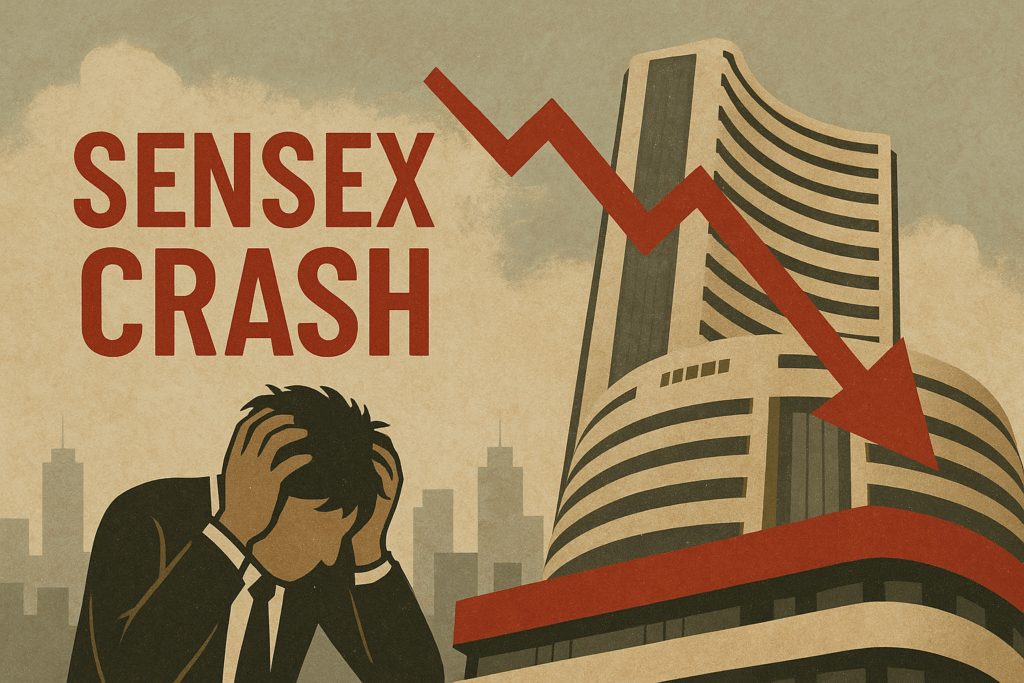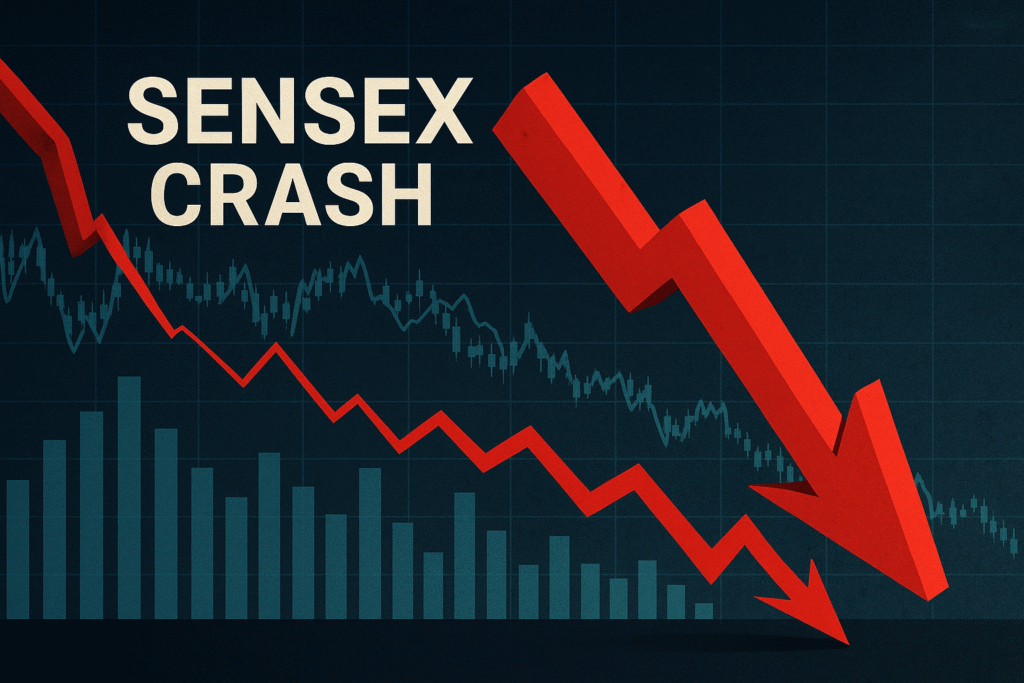The Indian stock market witnessed a major jolt today, as the Sensex crashed over 1,000 points and the Nifty slipped below the crucial 24,000 mark. The sudden market crash is largely attributed to escalating geopolitical tensions between India and Pakistan following the Pahalgam terror attack, which claimed the lives of 26 people. Stock Market Crash Today is the headline that’s dominating every financial news platform.
This blog breaks down what exactly happened, why it matters, and what it means for you — the everyday investor.
What Triggered the Market Crash?
Tensions have been on the rise after a deadly terror attack struck Pahalgam, a popular tourist destination in Jammu and Kashmir. The attack not only caused widespread outrage across the country but also triggered strong military and diplomatic responses from India.
In a swift retaliation, Indian authorities demolished homes of two suspected terrorists linked to the attack. In response, Pakistan closed its airspace for Indian airlines and suspended the Indus Water Treaty, escalating tensions further.
These developments sent shockwaves through Dalal Street, with investors quickly pulling out money amid fear and uncertainty. Stock Market Crash Today became the trending search term as fear gripped the trading floors.
Key Market Highlights (April 25, 2025)
- Sectors hit hardest: Banking, real estate, infrastructure, and travel
- Sensex: Fell over 1,050 points to close near 72,350
- Nifty 50: Dropped below 24,000, ending the day at 23,960
- Rupee: Also weakened slightly against the US Dollar
- Foreign Institutional Investors (FIIs): Net sellers in the Indian market today
Expert Opinion: Why the Fall Was So Sharp
According to market analysts, the Indian stock market has been riding on strong momentum over the past few months. But when geopolitical risk enters the picture, sentiment quickly turns bearish.
“Whenever there’s political instability or risk of conflict, investors get nervous. And when foreign investors sense risk, they often start pulling out funds. That’s exactly what we saw today,” said Anil Deshmukh, a Mumbai-based financial advisor.
Sectors That Took a Beating
Let’s take a closer look at the sectors that were hit the hardest:
1. Banking Stocks
Banks were among the worst performers. Stocks like HDFC Bank, ICICI Bank, and Axis Bank lost 2–3% as fear of economic slowdown and reduced lending activity grew.
2. Real Estate
High interest rate concerns and investor caution due to geopolitical tensions pulled real estate shares down sharply.
3. Travel & Tourism
With Pakistan closing its airspace and border tensions growing, aviation and tourism stocks saw heavy selling pressure. Indigo, SpiceJet, and IRCTC shares took a hit.
What Should Investors Do Now?
This is the big question. Should you sell everything? Or is this a buying opportunity?
Here’s a sensible approach:
Don’t Panic
Market corrections are normal — especially during times of crisis. Selling in panic usually leads to regret later.
Review Your Portfolio
This could be a good time to rebalance your portfolio. If you’re overexposed to sectors like travel or real estate, consider shifting towards defensive stocks (like FMCG or pharma).
Keep Some Cash Handy
If the market continues to fall, there might be opportunities to buy quality stocks at lower prices.

Historical Context: India-Pakistan Tensions & Stock Market
This isn’t the first time border tensions have rocked the stock market. Here’s a quick look back:
- Uri Attack (2016): Markets fell sharply for two days but recovered within a week.
- Pulwama-Balakot (2019): Initial fall, but markets bounced back quickly after clarity emerged.
In most cases, geopolitical tensions create short-term volatility, but the markets recover once the dust settles. Investors looking back may find that even during a Stock Market Crash Today, long-term growth trends remain intact.
Global Impact Also in Play
- It’s not just India-Pakistan tensions — global factors also contributed to the sell-off:
- Weak Global Cues: US and European markets also saw red today, affecting sentiment here.
- US Fed Policy: Hints at further interest rate hikes made global investors nervous.
- Crude Oil Prices: Rising prices due to Middle East unrest are hurting import-heavy economies like India.
What Investors Are Saying
Social media was abuzz today with reactions from investors and traders:
- “My portfolio just lost ₹1.2 lakh in a single day. Should’ve booked profits last week!”
- “I see this as an opportunity. Buying more TCS and Infosys at dips. Fundamentals haven’t changed.”
What’s Next for the Market?
It all depends on how the situation unfolds over the next few days. If tensions between India and Pakistan escalate further, the market could see more downside.
However, if diplomatic efforts help de-escalate the situation, markets may recover just as quickly. Many experts believe that the India growth story is intact, and long-term investors shouldn’t be too worried, even during a Stock Market Crash Today.
Final Thoughts
The Stock Market Crash Today may have shaken investor confidence, but it’s a reminder of how quickly things can change in global finance. Geopolitical tensions are outside our control, but our response to them — emotionally and financially — is in our hands.
Whether you’re a seasoned investor or just starting out, the key is to stay informed, avoid panic decisions, and focus on the bigger picture. Remember, every Stock Market Crash Today eventually becomes a recovery story tomorrow.



